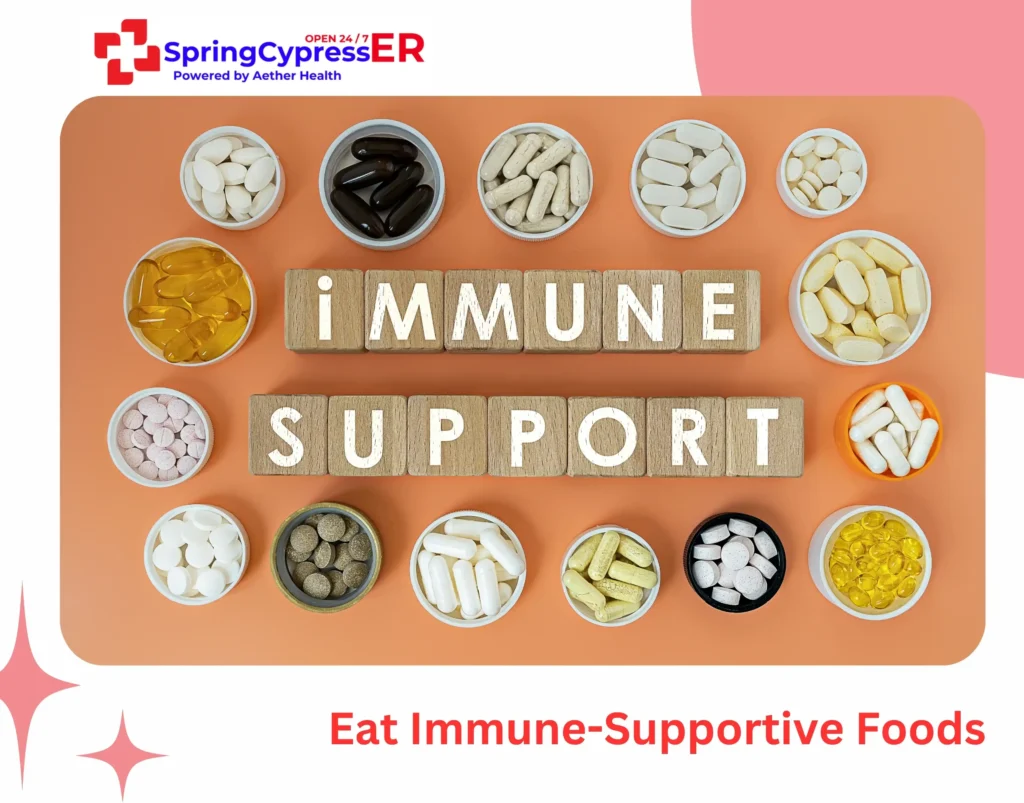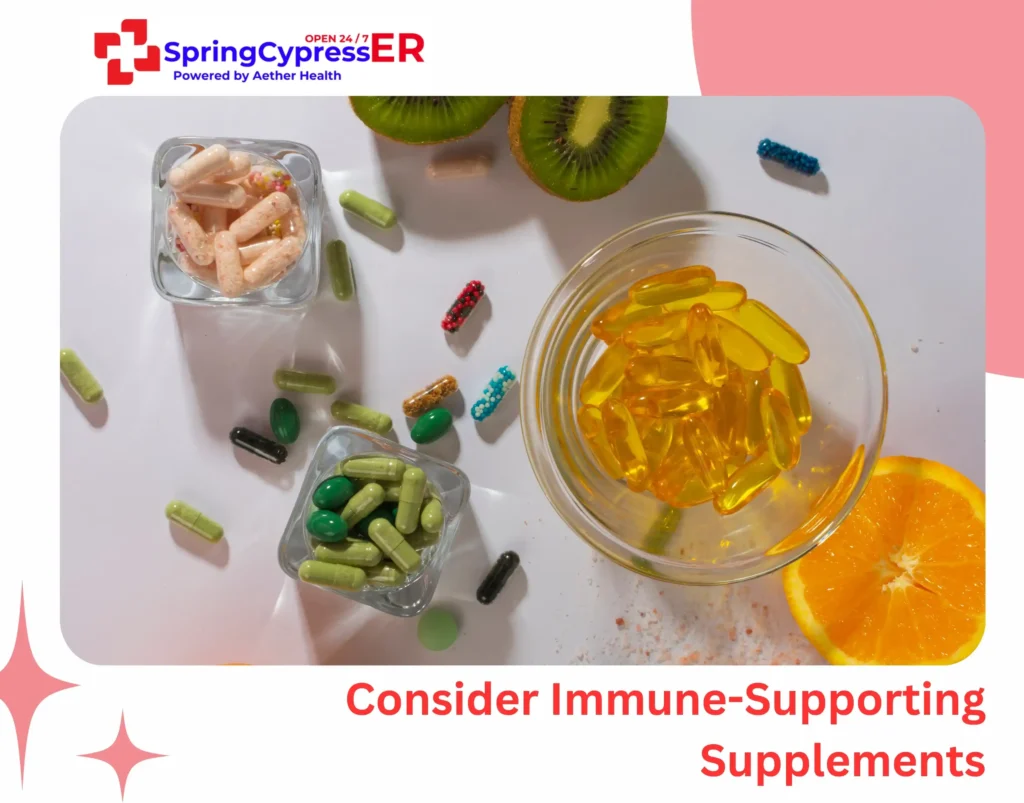When you’re sick, your immune system works overtime fighting off viruses or bacteria. This process consumes a lot of energy and nutrients, leaving you temporarily weaker and more susceptible to other illnesses. Infections can also cause inflammation and disrupt your gut health, both of which play crucial roles in immune function.
Supporting your immune system during recovery helps speed healing, restores balance in your body, and protects against reinfection. This guide covers nine evidence-based strategies to rebuild your defenses and restore your body’s natural protection:
1. Eat Immune-Supportive Foods

Nutrition is one of the most important factors in restoring immune health.
Key nutrients that help include:
- Vitamin C: Supports white blood cells. Found in citrus fruits, bell peppers, berries.
- Zinc: Essential for healing and immune cell function. Found in meat, beans, seeds.
- Vitamin D: Helps regulate the immune response. Get it from sunlight, fortified milk, or supplements.
- Protein: Necessary for repair and antibody production. Eggs, chicken, tofu, and lentils are great sources.
- Probiotics: Found in yogurt, kefir, and fermented foods, they support gut health and immunity.
2. Stay Well Hydrated
Water is crucial during and after illness. It helps flush out toxins, supports cell function, and keeps mucous membranes moist (a key immune barrier).
- Drink plenty of water, herbal teas, and broth.
- Avoid too much caffeine or alcohol, which can dehydrate you.
Aim for at least 8-10 glasses a day, and more if you’re sweating, have a fever, or just finished a viral illness.
3. Prioritize Sleep
Sleep is when your body repairs and regenerates. During recovery, your immune system rebuilds itself most effectively while you sleep.
- Aim for 7–9 hours of good-quality sleep.
- Keep a consistent schedule, even on weekends.
- Create a calming bedtime routine to help you relax.
Short naps during the day are also okay, but avoid sleeping too much, which can leave you feeling sluggish.
4. Move Gently
While strenuous workouts might be too much immediately after illness, gentle movement can support recovery and immune function.
Try:
- Stretching or yoga
- Short walks in fresh air
- Light home exercises
Exercise improves blood circulation, which helps immune cells move efficiently throughout your body. Listen to your body; if you feel tired, get rest.
5. Manage Stress
Chronic stress weakens the immune system by increasing levels of cortisol, a hormone that suppresses immune function.
To reduce stress:
- Practice deep breathing or meditation
- Spend time with loved ones or in nature.
- Journal your thoughts or practice gratitude.
- Take short breaks during your day to reset.
A calm mind supports a stronger immune system.
6. Consider Immune-Supporting Supplements

While food should come first, some supplements can help if you’re recovering from illness:
- Vitamin C and D
- Zinc
- Probiotics
- Elderberry or echinacea (some evidence suggests these may help shorten cold duration)
Always talk to your doctor before starting new supplements, especially if you’re on medication or recovering from a major illness.
7. Limit Sugar and Processed Foods
High-sugar diets can suppress immune function and increase inflammation, which slows recovery.
Avoid:
- Sugary drinks
- Candy and baked goods
- Processed snack foods
Instead, choose whole foods like vegetables, fruits, nuts, seeds, and lean proteins.
8. Get Some Sunshine and Fresh Air
Time outdoors helps:
- Boost Vitamin D (essential for immune health)
- Improve mood and reduce stress
- Promote better sleep rhythms
Try 15-30 minutes outside daily, even sitting on your balcony can help.
9. Take It Slow and Be Patient
One of the most overlooked aspects of recovery is giving your body enough time to heal. Don’t rush back into work, workouts, or stress. Even if your symptoms are gone, your body may still be regaining full immune strength.
- Listen to your body’s signals.
- Rest when needed.
- Be kind to yourself during recovery.
Rebuild Your Defenses After Illness

Recovery doesn’t end when symptoms disappear. Your immune system needs time and support to return to full strength after fighting infection.
Implementing these essential strategies helps restore your body’s natural defenses and prevents future illness. If you continue feeling weak or develop new symptoms during recovery, seek medical evaluation to rule out complications.
Frequently Asked Questions (FAQ)
1. How long does it take to fully recover your immune system after illness?
It depends on the illness and individual health, but most people recover in 1–3 weeks. For viral illnesses like the flu or COVID-19, immune recovery may take several weeks.
2. Can supplements really help boost immunity?
Yes, especially if you have deficiencies. Vitamins C, D, and zinc are well-studied. However, supplements should support—not replace—healthy eating and rest.
3. What foods are best for boosting immunity?
Fruits (especially citrus), vegetables (spinach, broccoli), nuts, seeds, lean proteins, and probiotic-rich foods like yogurt or kefir are all excellent.
4. Is it normal to feel tired even after the illness has passed?
Yes. Fatigue is common after infections, especially viral ones. Rest, proper nutrition, and hydration can speed up your energy return.
5. Should I exercise while recovering from illness?
Light activity like walking or stretching is okay and may help. Avoid intense workouts until you feel fully recovered to prevent setbacks.




